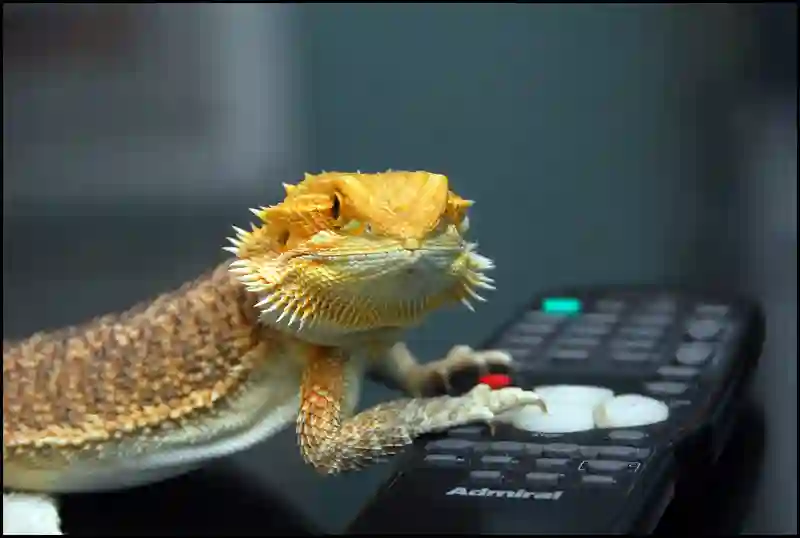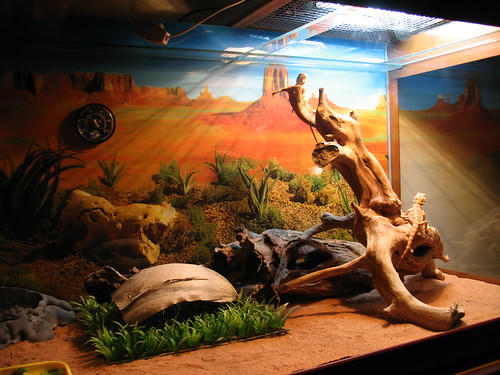There are several reasons why a baby bearded dragon may not be eating. Some possible reasons include:
- Low tank temperature or insufficient UVB lighting
- Stress
- Incorrect basking temperature
- Parasites, injury, or illness
- Preparing for brumation, a type of deep sleep
Some possible solutions include:
- Checking the enclosure temperature and ensuring that there is a basking spot of 95 to 105°F
- Checking the lighting setup and ensuring that it is correct
- Eliminating any stress by housing the baby bearded dragon alone and weighing it regularly
- Checking for impaction, which can cause a lack of appetite
- Ensuring that the tank is the right size
New to Home
When you first bring a baby bearded dragon home, it’s common for them to experience stress and anxiety due to the sudden change in its environment. This stress can result in a temporary loss of appetite. Give your new pet some time to adjust to their surroundings before expecting them to eat regularly.
Different Surroundings
Bearded dragons are sensitive creatures that may react to changes in their environment. If you’ve recently moved their enclosure, added new decorations, or made other significant changes, your baby bearded dragon may stop eating for a short period. Ensure their environment is stable and consistent to help them feel secure.
Other Pets
The presence of other pets, such as dogs, cats, or even other reptiles, can cause stress for your baby bearded dragon. This stress can lead to a lack of appetite. Make sure your bearded dragon’s enclosure is located in a quiet, low-traffic area away from other pets.
Incorrect Basking Temperature
Basking temperature plays a crucial role in your bearded dragon’s digestion and metabolism. If the temperature is too low, they may not be able to digest their food properly, leading to a loss of appetite. On the other hand, if the temperature is too high, it can cause stress and discomfort.
Bearded Dragon Tank Temperature Guide
To ensure your bearded dragon has the right basking temperature, follow these guidelines:
- Basking spot temperature: 100-110°F (38-43°C) for babies, 95-105°F (35-40°C) for adults
- Cool side temperature: 75-85°F (24-29°C)
- Nighttime temperature: 65-75°F (18-24°C)
Use a reliable thermometer to monitor the temperatures in your bearded dragon’s enclosure.
Incorrect UVB Lighting Setup
UVB lighting is essential for bearded dragons to synthesize vitamin D3, which helps them absorb calcium and maintain healthy bone growth. If your baby bearded dragon isn’t receiving proper UVB exposure, it may lose their appetite. Make sure you have a high-quality UVB light source that covers at least two-thirds of the enclosure and replace the bulb every six months.
Brumation
Brumation is a hibernation-like state in that bearded dragons enter when the temperatures drop and daylight hours decrease. During brumation, bearded dragons become less active and may stop eating altogether. While brumation is more common in adult bearded dragons, it’s possible for younger ones to experience it as well. Monitor your bearded dragon’s behavior and consult a vet if you’re unsure about its health.
Shedding
When bearded dragons shed their skin, they may temporarily lose their appetite. Shedding can be uncomfortable and stressful, causing them to focus more on the shedding process than on eating. Ensure your bearded dragon’s enclosure has the proper humidity levels to help facilitate a smooth shedding process.
Impaction
Impaction occurs when a bearded dragon’s digestive system becomes blocked due to the ingestion of indigestible materials, such as a loose substrate or large insects. This can cause pain and discomfort, leading to a loss of appetite. If you suspect impaction, consult a veterinarian immediately. To prevent impaction, use a non-particulate substrate, like reptile carpet or slate tiles, and ensure you’re feeding appropriate-sized insects.
Injury
Injuries can cause bearded dragons to lose their appetite. If your baby bearded dragon has sustained an injury, such as a fall or a bite from a cage mate, they may be in pain and not interested in eating. Consult a veterinarian if you notice any injuries or unusual behavior.
Illness or Infection
Various illnesses and infections can cause a bearded dragon to stop eating. These may include metabolic bone disease, respiratory infections, or parasites. If you suspect your baby bearded dragon is sick, consult a veterinarian for diagnosis and treatment.
Conclusion
There are many reasons why a baby bearded dragon may not be eating, ranging from stress to improper environmental conditions, to health issues. It’s essential to monitor your pet’s behavior and address any concerns promptly. Consult a veterinarian if you’re unsure about your bearded dragon’s health or if they continue not to eat.
FAQs
What can I feed my baby bearded dragon to stimulate its appetite?
Try offering a variety of insects, such as crickets, dubia roaches, or small superworms, and fresh vegetables like collard greens or squash.
How often should a baby bearded dragon eat?
Baby bearded dragons should eat insects two to three times a day and vegetables daily.
Baby Bearded Dragon Not Eating and Sleeping a Lot
If your baby bearded dragon is not eating and also sleeping a lot, it could be due to stress, brumation, or illness. Monitor their behavior and consult a veterinarian if you’re concerned about their well-being.
How Long Can Baby Bearded Dragons Go Without Eating?
A healthy baby bearded dragon can go without food for up to a week, but it’s not ideal. If your baby bearded dragon hasn’t eaten in several days, try offering a variety of food items and double-check their environmental conditions. If the issue persists, consult a veterinarian.
When should I be concerned about my baby bearded dragon not eating?
If your bearded dragon hasn’t eaten in more than a week or shows signs of illness or injury, consult a veterinarian.
Can stress cause my baby bearded dragon to stop eating?
Yes, stress can lead to a loss of appetite in bearded dragons.
How can I help my bearded dragon feel more comfortable and secure in their enclosure?
Provide hiding spots, ensure proper temperature and lighting, and avoid sudden environmental changes.


